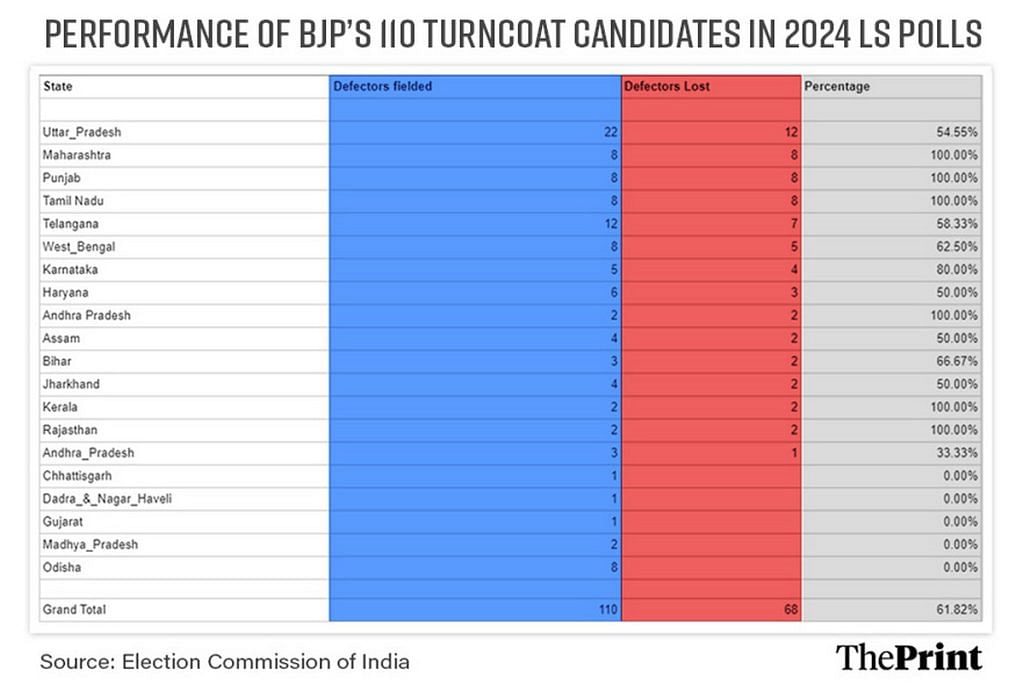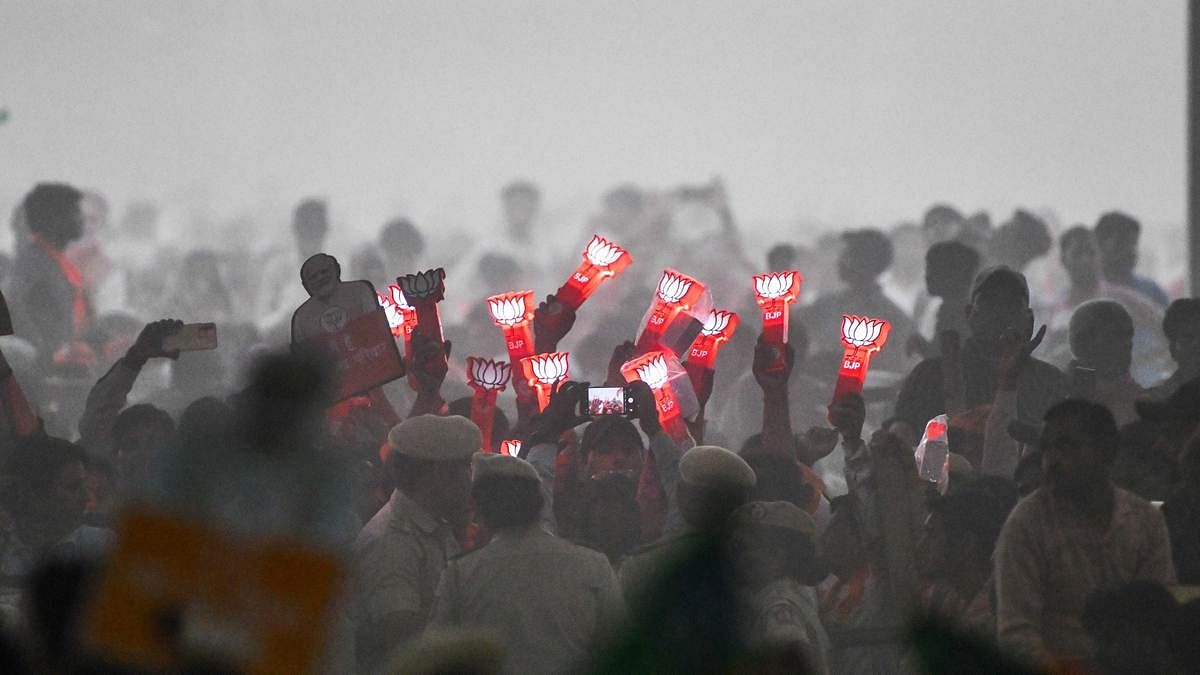New Delhi: Nearly a quarter of the BJP’s 441 candidates for this year’s Lok Sabha elections were defectors who had joined the party during the ‘Modi era’ from 2014 onwards. In all, about 62 percent of these candidates were defeated.
In absolute terms, the BJP fielded 110 candidates who switched to the party after Narendra Modi first came to power as Prime Minister, with 69 of them losing. The party also put up 14 pre-2014 defectors and 6 allies running on its tickets, bringing the total of candidates with non-BJP origins to 130.
Further, 34 BJP candidates had been with the party for two years or less, joining in 2023 or 2024. Of these, 27 lost. This tally includes 21 out of 26 candidates who joined only this year.
Notable losers from the BJP’s pool of defectors included Ravneet Bittu (Ludhiana), Hans Raj Hans (Faridkot), Sushil Kumar Rinku (Jalandhar), Arvind Kumar Sharma (Rohtak), Jyoti Mirdha (Nagaur), and Anil Antony (Pathanamthitta).
On the flip side, prominent winners included Ravi Kishan (Gorakhpur), Jitin Prasada (Pilibhit), Jyotiraditya Scindia (Guna), and Naveen Jindal (Kurukshetra).
At least 38 of the candidates who joined the BJP from 2014 onwards came from the Congress, the highest from any party. More than half—20— of these candidates lost, including Bittu, Mirdha, and Antony.

After the Congress, other parties contributing switchover candidates were the Bahujan Samaj Party (11), Bharat Rashtra Samithi (9), Trinamool Congress (7), Biju Janata Dal (6), Nationalist Congress Party (4), Samajwadi Party (4), and All India Anna Dravida Munnetra Kazhagam (4).
The BJP’s strategy to induct rebels from other parties is seen as part of its expansionist agenda in traditionally weak states, but it has sparked internal rebellions and ire among long-time members. In Gujarat’s Sabarkantha, for example, party leaders protested replacing original candidate Bhikaji Thakor with Shobhana Baraiya, the wife of a former Congress legislator who joined the BJP. Despite the rumblings of discontent, the BJP won the seat.
“Ever since the party attempted to expand its reach and political footprint, which I would say was since the early 2000s, there was a clear attempt to reach out to sections and leaders who were not necessarily associated with their core agenda,” Karnataka-based political scientist and Jain University pro vice-chancellor Sandeep Shastri had earlier told ThePrint.
He also pointed out that while inducting new leaders could help the BJP strengthen its “geographical footprints”, it could weaken perceptions of the party’s ideological commitment and erode discipline among the ranks.
BJP spokespersons have repeatedly claimed that the sole criterion for candidate selection is “winnability.” However, this strategy seems to have fallen short, with the BJP’s seat tally dropping from 303 in 2019 to 240, below the majority mark of 273.
“The party will sit down and analyse the loss,” BJP national spokesperson RP Singh told ThePrint. “It is too early for us to comment on the reasons for these numbers. You can’t have sweeping analysis for all seats. Each region has its own reasons to look at. West Bengal would have different reasons and for UP it would be different.”
Also Read: 1 in every 4 BJP & Congress Lok Sabha candidates are political legatees, finds new study
Low pay-offs on rebel bets
A closer look at the defectors shows 68 jumped ship to the BJP in election years—2014, 2019, or 2024. But 41 of them lost.
Among the losers were Ram Kripal Yadav from Pataliputra (joined in 2014 from RJD), Neeraj Shekhar from Ballia (joined in 2019 from SP), and Preneet Kaur from Patiala (joined in 2024 from Congress).
As many as 34 candidates, including Ashok Tanwar (Sirsa), Sita Soren (Dumka), and Naveen Jindal (Kurukshetra) have barely spent two years in the party. They joined in 2023 or 2024, often replacing long-time BJP loyalists on candidate lists, and a mere 7 among them won.
Beyond the 110, there were at least 10 senior leaders in the hustings who joined before 2013, when Modi came to the national stage. One well-known example is Maneka Gandhi (Sultanpur), who joined the BJP in 2004 after stints in the Janata Dal and as an Independent. This time, the former Union minister lost her 10th Lok Sabha election since 1984. Three others from this category who lost were S S Ahluwalia (Asansol), Vijay Baghel (Durg), and Ramdas Chandrabhanji Tadas (Wardha).
State-wise data shows that the BJP fielded many defectors in states where it is trying to expand its footprint, especially in the east and south. This has yielded mixed results.
In Tamil Nadu, Telangana, and Odisha, 28 candidates were ‘outsiders,’ mostly from regional parties. Fifteen lost—7 in Telangana and all 8 in Tamil Nadu. In Odisha, however, all 8 won their seats.
In Andhra Pradesh, 5 of 6 candidates were outsiders—3 lost, while the 2 winners included CM Ramesh, formerly of the BJP’s ally Telugu Desam Party, from Anakapalle.
In West Bengal, where the BJP aimed to expand but failed, it fielded 8 outsiders, with 5 losing.
Many defectors lost in UP, Maharashtra
Even in Hindi heartland states, where the BJP is ruling, the party has relied heavily on defector candidates. In Uttar Pradesh, 22 of the 76 candidates were inductees from regional parties. Twelve of these contributed to the party’s setback in the state.
In Haryana, six out of ten candidates were former Congress members. Three of them lost this time. Similarly, in Jharkhand, 5 out of 13 candidates were defectors. The BJP lost all these seats except Dhanbad and Kodarma.
Further west in Maharashtra, another state where the BJP underperformed, 8 out of 28 candidates were defectors. All of them lost.
In addition to the 110 defectors, there were also 6 seats where ally party candidates contested on BJP tickets. Except for Vinod Kumar Bind from the Nishad Party, who won from UP’s Bhadohi, all 5 lost. These included Praveen Kumar Nishad, son of Nishad Party president Sanjay Nishad, in Uttar Pradesh’s Sant Kabir Nagar. The other constituencies were Vellore (New Justice Party), Perambalur (Indhiya Jananayaga Katchi), and Tenkasi (Tamil Nadu Muslim Munnetra Kazhagam).
(Edited by Asavari Singh)
Also Read: How Akhilesh Yadav trumped Modi-Yogi in Uttar Pradesh — ‘sway of caste over communal politics’

